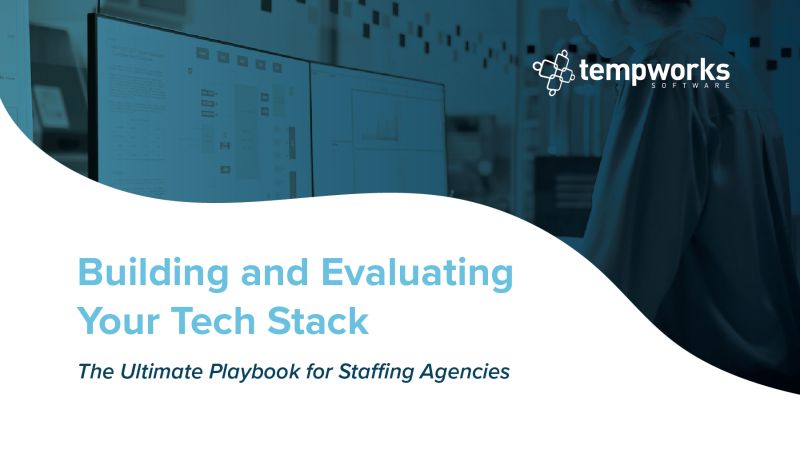If you’ve interacted with news or social media in the past year, you know that AI is transforming the way we live and work.
From smart assistants to predictive algorithms, AI is becoming an integral part of our daily lives. It isn’t just a fad, either; AI has real implications for our workplace, our careers, and our culture.
As artificial intelligence advances, it brings forth ethical and legal considerations that demand careful examination.
If you are adopting AI in your business practices (and you should), there are several ethical and legal considerations to carefully examine.
Transparency and Accountability
Driven by complex algorithms, AI systems can make decisions and predictions based on data analysis. This capability, while promising, raises questions about accountability and transparency.
As AI systems help staffing professionals make decisions, it’s crucial for users to understand the factors influencing those choices.
Lack of transparency can lead to mistrust and raises questions about accountability when things go awry. Striking the right balance between the complexity of AI algorithms and user comprehension is a challenge that requires careful consideration.
Privacy Concerns
The vast amounts of data fueling AI systems often include personal information. According to MIT, “AI models trained on internal data could even violate companies’ own privacy policies.”
That’s why it’s essential to establish robust data protection measures and ensure that individuals have control over their data—with clear guidelines on how it will be used.
As a staffing firm, you’re responsible for safeguarding critical personal information for your employees and your customers. To be safe, make sure you’re keeping your data in house (within your ATS/CRM software) and partnering with technology providers you can trust.
Learn more about how you can protect your company’s data.
Legal Implications & Plagiarism
From a legal perspective, the rapid evolution of AI poses challenges to business owners. When AI influences crucial aspects of our lives—such as job recruitment, financial decisions, or even business recommendations—it’s imperative to ensure that these systems operate ethically and within legal boundaries.
The problem is: Technology is outpacing the growth of legislation. As lawmakers work to catch up, business owners will want to keep an eye on the legislative landscape at the local, state, and federal levels.
For example, an Illinois law now requires job candidates to be notified if the employer is using AI to evaluate video interviews. Staffing firms in Illinois might already be using AI in employee screening, meaning a new law will require them to adjust their practices. Similar legislation, prohibiting the use of certain facial recognition services during an applicant’s interview for employment unless the applicant consents, exists in Maryland.
New York City has enacted Local Law 144 of 2021, regarding automated employment decision tools. Under the law, employers and employment agencies are prohibited from using an automated employment decision tool unless the tool has been subject to a bias audit within one year of use of the tool, information about the bias audit is publicly available and notices have been provided to employees or job candidates. Employers will have to determine how to perform the bias audits required under the law and how to disclose these audits properly.
Plagiarism
A hot topic in legal discussions around AI has been plagiarism. In September 2023, authors joined together to file a lawsuit against OpenAI and Microsoft, alleging copyright infringement. Essentially, it is alleged that OpenAI used copywritten material to train its algorithms without crediting its sources.
On the technology front, several coders sued GitHub, Microsoft, and OpenAI over their product Copilot. The coders claimed Copilot was trained on billions of lines of open source code. Legally, open source material can be used—but it almost always requires attribution.
Staffing firms will want to keep an eye on legal shifts and plagiarism concerns as these issues continue to take shape. It’s also helpful establish internal guidelines for using AI tools responsibly.
Bias and Fairness
AI algorithms are only as unbiased as the data that trains them.
That means if historical data used to train these systems hold biases, AI can perpetuate—and even amplify—those biases.
Addressing bias in AI models requires ongoing vigilance and efforts to continually refine algorithms and eliminate discriminatory patterns. In the meantime, there are steps staffing firms can take to guard against bias.
That’s where the human component comes in. We need real people to evaluate AI-generated content, think critically about AI recommendations, and analyze the impact of AI tools in hiring practices.
The Human Element (Don’t Worry; It’s Not Going Anywhere)
Despite the incredible capabilities of AI, it’s crucial to remember that AI is a tool—designed to be used by real people. AI complements human decision-making; it can’t replace it entirely.
As a result, when jobs are impacted by advancements in technology, workers are more likely to work hand-in-hand with AI or receive new career opportunities instead of losing their job. Many receive training or upskilling, while others simply use AI to enhance their existing practices.
Maintaining human oversight ensures that ethical considerations are at the forefront, preventing undue reliance on AI systems in situations that demand nuanced judgment or empathy.
Final Takeaways
As AI continues to shape the staffing industry, it’s important to stay aware of the ethical and legal implications. Striking a balance between innovation and responsibility will be crucial in ensuring that AI contributes positively to our society, respecting the values we hold dear.
By navigating these considerations thoughtfully, you can harness the potential of AI while upholding ethical standards and legal integrity.

